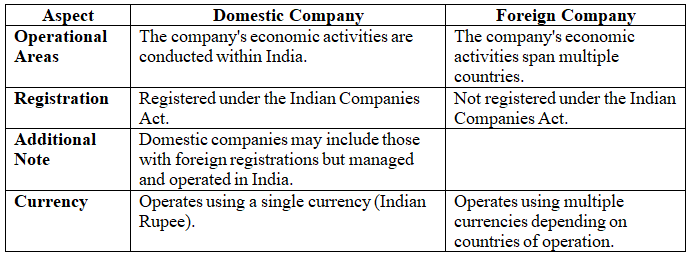Corporate Tax Planning: Concepts & Significance | Crash Course for UGC NET Commerce PDF Download
Businesses in India are taxed according to the profits generated during the financial year, contributing significantly to government revenue. Adhering to these tax regulations ensures a smooth business environment and minimizes potential disputes. However, such taxes can reduce a company's earnings. To address this, implementing a corporate tax planning system is essential. This system aids in minimizing tax liabilities, allowing companies to retain more income. Effective corporate tax planning strategies can help businesses maximize their profits.
What is Corporate Tax?

In India, both domestic and foreign companies are required to pay corporate taxes on their incomes according to the Indian Income Tax Act of 1961.
- Businesses must adhere to these regulations, as non-compliance can result in substantial fines or even the cessation of operations.
- Domestic companies, registered under the Indian Companies Act, are obligated to pay taxes on their worldwide income, encompassing earnings from India and other countries.
- Foreign companies conducting business in India are also liable for taxes on income generated within the country.
- Corporate tax planning involves strategies aimed at reducing these tax liabilities for long-term advantages, emphasizing the importance of minimizing obligations and leveraging legal tax exemptions.
Corporate Tax Planning:
Corporate tax is akin to individual income taxes but applies to businesses. Companies can leverage tax exemptions and deductions to minimize tax liabilities, resulting in higher available income for profit distribution and organizational advancement.
What is Corporate Tax Planning?
Corporate tax planning involves employing strategies to reduce tax responsibilities and enhance profits. Businesses need to engage in corporate tax planning consistently throughout the year to optimize their earnings.
Nature of Corporate Tax Planning:
- The essence of corporate tax planning lies in creating plans and forecasts. Companies estimate their incomes and strategize tax-exempt investments for the fiscal year.
- The scope of corporate tax planning encompasses both long-term and short-term company strategies.
- Accurate income reporting is crucial for companies, ensuring compliance with tax slabs and regulations to determine tax obligations.
Advantages of Corporate Tax Planning:
Corporate tax planning benefits companies by facilitating financial estimation and planning. It enables businesses to assess their financial obligations and allocation of funds for the year.
Advantages of Corporate Tax Planning:
- Corporate tax planning involves creating strategies for future earnings and tax savings, focusing on future outcomes.
- It aims to reduce tax burdens for both individuals and companies, emphasizing the importance of tax savings.
- Encourages companies to invest in tax-free avenues, fostering investment practices aligned with long-term company objectives.
- Tax planning is flexible and adjusts to changes in tax regulations, staying relevant and compliant.
- It is a legitimate and moral practice that helps in minimizing financial liabilities.
- Enables the realization of both short-term and long-term organizational goals through efficient tax management.
Essential Features of Corporate Tax Planning
- Corporate tax planning encompasses creating strategies for future earnings and tax savings, focusing on future outcomes.
- It aims to reduce tax burdens for both individuals and companies, emphasizing the importance of tax savings.
- Encourages companies to invest in tax-free avenues, fostering investment practices aligned with long-term company objectives.
- Tax planning is flexible and adjusts to changes in tax regulations, staying relevant and compliant.
- It is a legitimate and moral practice that helps in minimizing financial liabilities.
- Enables the realization of both short-term and long-term organizational goals through efficient tax management.
Scope of Corporate Tax Planning
Corporate tax planning involves various important aspects that are crucial for a company's financial management and compliance with tax regulations. Below are the key points summarized in a bullet format:
- Analysis of Company Statements: Corporate tax planning entails examining a company's financial records to understand its financial requirements.
- Futuristic Approach: Tax planning looks ahead to anticipate and cater to the future financial needs of the company.
- Income Coverage and Reporting: Tax planning encompasses all sources of company income, necessitating accurate and truthful reporting by taxpayers.
- Alignment with Company Goals: Essential for the company's objectives, tax planning includes strategies like diversification and optimizing the company's structure.
- Enhancing Budget Efficiency: Tax planning plays a vital role in ensuring the efficiency of a company's budget, as tax liabilities directly impact financial resources.
- Legal Compliance: Corporate tax planning must adhere to the laws and regulations of the country in which the company operates.
Techniques for Corporate Tax Planning
- Expense Management: The company should maintain detailed records of all expenses to ensure nothing is overlooked, such as unorganized labor costs.
- Deductions and Exemptions: It is crucial for the company to take advantage of available deductions and exemptions in a timely manner, ideally before the end of the financial year.
- Corporation Structure: Companies can consider adopting structures like a limited liability company, which can help in reducing tax obligations.
- International Structure: Companies may explore transferring funds to jurisdictions with lower tax rates, a strategy often employed by multinational corporations to reduce their overall tax burden.
Process of Corporate Tax Planning
The process of corporate tax planning involves several essential steps that organizations need to follow:
- Setting Goals: The company should establish taxation and corporate goals for the year, aiding in the selection of appropriate investment instruments.
- Information Gathering: Management needs to gather information about the company’s financial status, including estimates of income from various sources and tax liabilities.
- Tax Strategies: The company must choose relevant tax strategies that align with its goals, aiming to minimize tax liabilities.\
- Investment: Selected tax-exempt investments should be made during the financial year, with proper records maintained.
- Tax Payments and Returns: It is crucial for the company to pay the necessary taxes and submit returns reflecting deductions and exemptions.
Indian Corporate Tax Rate
The regulations mandate that companies adhere to tax requirements and make timely payments or tax-exempt investments. Below are the varied tax rate regulations applicable in India.
Tax Rates for Domestic Companies
Domestic companies in India, registered under the Companies Act, encompass both public and private enterprises. Here are the tax rate specifics:
Corporate Tax Planning
- Domestic businesses are currently subject to a tax rate of 30%.
- A surcharge of 7% applies if the income falls between ₹1 Crore and ₹10 Crores. For companies exceeding ₹10 Crores in revenue, the surcharge is 12%.
- In 2019, Section 115 BAA brought about alterations in the effective tax rate for companies, setting it at 25.168%.
- The fundamental tax rate stands at 22%, accompanied by a 10% surcharge and a 4% Cess, resulting in an effective rate of 25.168%. This tax reduction is advantageous for companies.
Tax rates for foreign companies
- Foreign companies operating in India must adhere to specific corporate tax regulations.
- For royalties and fees earned within India, a 50% tax rate is applicable.
- For other income types, including balances, the tax rate stands at 40%.
- An additional 2% charge applies if the income falls between ₹1 Crore and ₹10 Crores.
- If the revenue surpasses ₹10 Crores, the extra charge increases to 5%.
Additional Charges
- Companies are obligated to pay a 4% health and education cess, irrespective of their annual earnings.
- When companies avail benefits under Section 115BAA, they are exempted from paying the Minimum Alternate Tax as per Section 115JB.
Corporate Tax- An Overview
Find below an overview of what companies in India are required to pay in taxes:
Domestic Companies

Foreign Companies

Objectives of Corporate Tax Planning
Below are the objectives and benefits of corporate tax planning:
Benefits of Corporate Tax Planning
Increase Savings:
- Companies can reduce taxes and increase savings through corporate tax planning.
- This saved income can be utilized for company growth, emergency funds, or distribution among shareholders.
Economic Stability:
- Corporate taxes are crucial for government revenue, promoting economic stability and infrastructure development.
- Legal tax planning ensures a steady income for the government annually.
Enhance Growth:
- Corporate growth is facilitated by savings achieved through tax planning.
- Profits can be reinvested to enhance products, production efficiency, and adopt new technologies.
Corporate Tax Planning
Minimization of Litigation:
- Adhering to legal measures in tax planning reduces income tax and prevents litigation from tax authorities.
- Illegal practices can lead to fines and penalties for the business.
Productive Investments:
- The company aims to engage in investments within exempt domains to optimize tax savings. These strategic investments not only offer immediate tax benefits but also contribute to long-term financial stability. The allocated funds can be utilized for addressing emergencies or achieving future organizational objectives.
Types of Corporates

Indian taxation laws categorize companies into two main types: domestic and foreign corporates. These classifications are crucial for understanding the distinct corporate tax planning requirements for each.
Types of Corporate Tax Planning:
Types of Tax Planning
Tax planning involves structuring your financial matters to minimize the amount of tax you owe while still complying with the law. There are several strategies that individuals and businesses can use to reduce their tax burden. Let's explore some common types of tax planning:
- Long-term Tax Planning: Long-term tax planning focuses on strategies that can be implemented over several years to maximize tax efficiency. This may include retirement planning, investment strategies, and estate planning.
- Short-term Tax Planning: Short-term tax planning involves strategies that can be applied within the current tax year to lower tax liabilities. This may include maximizing deductions, tax credits, and deferring income.
- Capital Gains Tax Planning: Capital gains tax planning aims to minimize the taxes paid on profits from the sale of assets such as stocks, real estate, or other investments. Strategies may involve timing sales, utilizing tax-efficient accounts, and offsetting gains with losses.
- Estate Tax Planning: Estate tax planning focuses on strategies to minimize taxes on the transfer of wealth to heirs. Techniques may involve setting up trusts, gifting assets, and utilizing estate tax exemptions.
- Business Tax Planning: Business tax planning involves strategies to optimize tax outcomes for businesses. This may include structuring entities efficiently, taking advantage of deductions and credits, and managing income and expenses.
Tax Planning Strategies
- Income Splitting: This involves redistributing income among family members or legal entities to leverage lower tax brackets or exemptions. For instance, a business owner might pay their spouse or children a salary or dividends from the business.
- Tax Credits: These are deductions from your tax liability, not your taxable income. Utilize various tax credits like the Child Tax Credit, Education Credits, and Renewable Energy Credits.
- Tax Deductions: Reduce your taxable income by claiming deductions such as mortgage interest, charitable contributions, and business expenses.
- Tax-Advantaged Accounts: Contribute to accounts like 401(k)s, IRAs, HSAs, and 529 plans to lower taxable income and enjoy tax benefits.
- Capital Gains and Losses Management: Timing the sale of investments impacts your capital gains tax. Use strategies like tax-loss harvesting to offset gains with losses.
- Estate Tax Planning: Structure your estate to minimize estate taxes upon your death, including setting up trusts and utilizing the applicable exclusion amount.
- Business Tax Planning: Employ strategies like choosing the right business structure, depreciating assets, and utilizing available business tax deductions.
- International Tax Planning: Optimize global tax obligations with strategies like transfer pricing, foreign tax credits, and offshore tax shelters.
- Tax-Efficient Investing: Choose investments wisely and hold them long-term to reduce capital gains taxes, considering options like index funds.
- State and Local Tax Planning: Minimize state and local taxes through strategies like relocating to lower-tax areas or structuring investments efficiently.
- Retirement Tax Planning: Optimize Social Security benefits, manage RMDs, and plan for tax-efficient withdrawals from retirement accounts.
Advanced Tax Planning Strategies
- Real Estate Tax Planning: Use strategies like 1031 exchanges to defer capital gains taxes and maximize deductions in real estate investments.
- Tax-Deferred Exchanges: Utilize exchanges like like-kind exchanges to defer capital gains taxes by reinvesting in similar assets.
- Charitable Giving: Make donations to qualified charities for tax deductions, considering advanced strategies like charitable remainder trusts.
- Alternative Minimum Tax (AMT) Planning: High-income individuals should consider AMT planning to reduce the impact of this parallel tax system.
It's essential to stay updated on tax laws by consulting tax professionals or financial advisors to ensure compliance with current tax regulations.
Understanding Tax Rebates for Companies
Companies operating under the Indian Income Tax Act can benefit from various tax rebates to manage their tax liabilities effectively.- Deductions for New Ventures and Exports: Deductions are available for new ventures or operations and exports under specific circumstances.
- Dividends from Domestic Companies: Domestic companies receiving dividends from other domestic companies can deduct this income under specific circumstances.
- Infrastructure and Electricity Installations: Specific deductions are provided for new infrastructure and electricity source installations.
- Venture Capital Funds: Special deductions are applicable for venture capital funds and enterprises.
- Carrying Forward Business Losses: Business losses can be carried forward for up to eight years to offset future profits.
- Interest, Dividends, and Capital Gains: In certain company situations, interest, dividends, and capital gains are deductible.
These rebates play a crucial role in enabling companies to generate income without hefty tax burdens. By engaging in sound corporate tax planning within the legal frameworks, businesses can effectively reduce their tax obligations.
Corporate Tax Planning
Corporate tax planning is a strategic approach that businesses use to manage their tax liabilities efficiently. It involves analyzing various financial aspects to ensure the company pays the right amount of tax, not more, not less.
Benefits of Corporate Tax Planning
- By engaging in effective corporate tax planning, businesses can save money in taxes. This saved money can then be reinvested in the company for growth and diversification.
- Corporate tax planning allows for strategic investments that can yield long-term benefits for the company. These investments can also serve as emergency funds in times of need.
- Through proper tax planning, businesses contribute legal and transparent tax revenue to the government. This, in turn, helps promote economic growth and stability.
- Companies that engage in corporate tax planning can avoid disputes by following legal measures to reduce their tax burden. This ensures compliance and reduces the risk of penalties.
- Additionally, corporate tax planning enables businesses to estimate and plan their earnings for the year accurately. This aids in financial preparation and correct financial estimations.
Limitations of Corporate Tax Planning
The following are important limitations that business owners should consider when engaging in corporate tax planning:
- Corporate tax planning can tie up company funds. Businesses are required to invest in tax-exempt sources to reduce their tax burden.
- There is a risk that businesses may engage in tax evasion by misinterpreting exemption laws.
- Tax-exempt investments often yield lower interest rates compared to taxable investments.
Conclusion
Companies must adhere to corporate tax planning regulations to achieve timely and lawful tax savings. Corporate tax planning offers numerous advantages and disadvantages. It facilitates regular assessments, ensuring that the company generates higher income. This practice should be implemented at the beginning of the year, and companies must strictly adhere to the rules for tax-saving measures.
|
145 videos|236 docs|166 tests
|
FAQs on Corporate Tax Planning: Concepts & Significance - Crash Course for UGC NET Commerce
| 1. What is corporate tax and why is it important for businesses? |  |
| 2. What are the essential features of corporate tax planning? |  |
| 3. What techniques can be used for effective corporate tax planning? |  |
| 4. How does the corporate tax planning process work? |  |
| 5. What is the current corporate tax rate in India? |  |





















